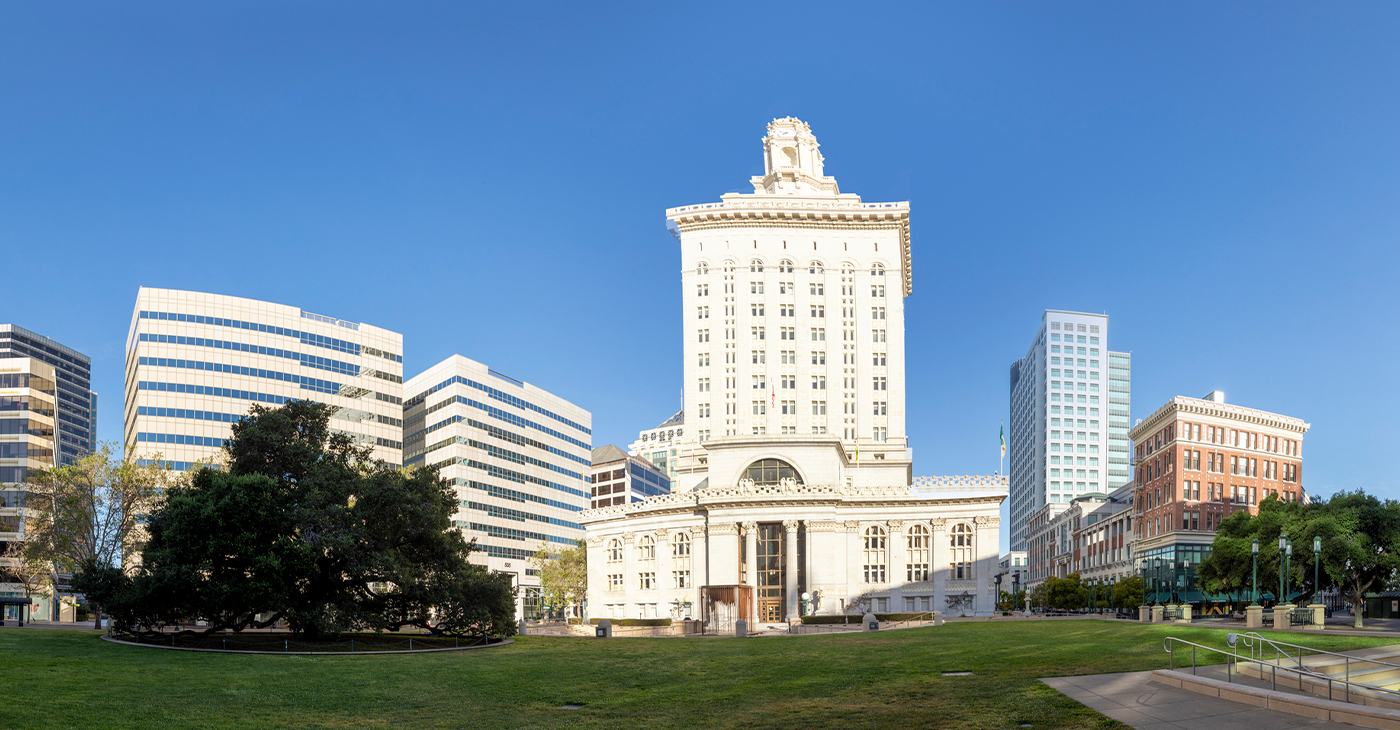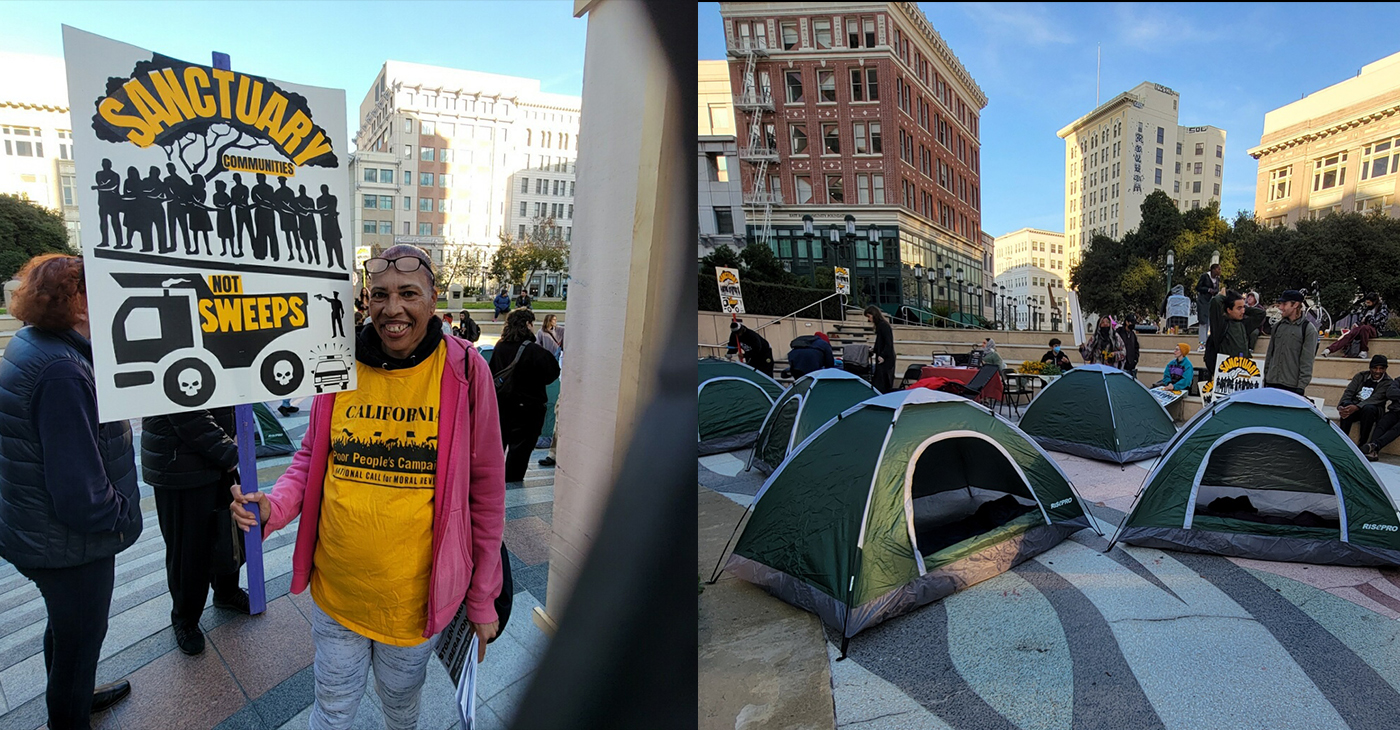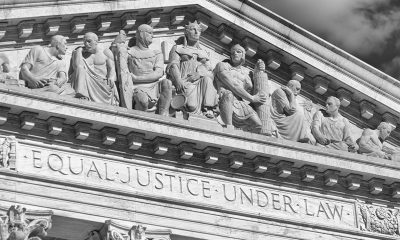Politics
NAACP Sponsors Panel, March and Rally in Shelby County on 2nd Anniversary of Supreme Court Decision Gutting Voting Rights Act

Rally in front of Shelby County courthouse participants holding up signs of states covered by the Voting Rights Act. (Courtesy Photo)
by John Zippert
Special to the NNPA from the Greene County Democrat
The Shelby County Chapter of the NAACP with support from the statewide organization and many partners held a panel, march, rally and church services this weekend to remember the second anniversary of the Shelby vs. Holder decision by the U. S. Supreme Court and work to restore the Voting Rights Act (VRA).
The Supreme Court in a June 2013 – 5 to 4 decision – ruled that the criteria in Section 4 of the act describing the criteria for states and geographic areas that would require preclearance of voting changes in Section 5 was outdated and unconstitutional. The Supreme Court’s decision in the Shelby County, Alabama case gutted the VRA and made it ineffective in over-ruling discriminatory changes in local and state voting rules and procedures.
Many southern states have adopted more restrictive voter registration and identification rules, reduced early voting, and generally adopted policies that suppress the votes of poor people and people of color, since the Shelby vs. Holder decision.
The Alabama State Conference of the NAACP held a panel discussion on Friday night at the New Mt. Moriah Baptist Church in Calera, Alabama. Among the participants were: Laughlin McDonald of the ACLU Voting Rights Project, Congresswomen Terri Sewell, Jerome Gray of the Alabama Democratic Conference, Denise Sanchez of the Alabama Coalition for Immigrant Justice and Hillary Shelton of the NAACP Washington Bureau.
Congresswomen Sewell pledged to introduce a new bill called the Voting Rights Reconstruction Act of 2015 which will modernize the requirements of the 1965 VRA and make sure Alabama is included as one of the states which will require pre-clearance of voting challenges.
Sewell told the story of the difficulties she had in securing a picture voter ID for her own father, who is now disabled, so he could vote in the November 2014 general election. “There were many obstacles and barriers in the Dallas County Courthouse which limited my father’s access to the Registrar’s office to secure the proper voting ID. It took a day of work and carrying him in a wheel chair up stairs but we were finally successful in getting a picture ID card,” said Sewell.
Jerome Gray explained “ in 1965 there were 150,000 Black voters registered in Alabama but now in 2015 there are 770,000, although there are still 300,000 or more unregistered Black voters. There were ten Black elected officials in 1965 and now there are 800.”
“The VRA did away with literacy tests, the poll tax and limitations on access to the polls. The VRA in Section 208 allows the voter to bring anyone to help him or her vote. There are language requirements in areas where Hispanics are a majority that the ballot be in printed in Spanish and other languages of the predominant voting block,” said Gray.
He said, “ We still have 105,000 mostly Black felons in Alabama whose right to vote must be restored. We also need to understand the importance of voting and that a high turnout of voters can win elections.”
Hillary Shelton of the NAACP spoke to the uphill battle ahead in Congress to restore the Voting Rights Act. He announced that the NAACP will be holding a six week march to restore the VRA beginning on August 1 in Selma, Alabama and traveling north through Georgia, South Carolina, North Carolina, Virginia on to arrive in Washington on September 15.
On Saturday, about 150 people marched ten blocks through downtown Columbiana, the county seat of Shelby County to the Courthouse. A rally with many additional speakers was held in front of the Courthouse.
Attorney Duell Ross of the NAACP Legal Defense Fund, a lawyer in the Shelby County case called “the Voting Rights Act, the crown jewel of our democracy, a checkpoint for justice that must be restored. The VRA act was the most effective law for civil rights in the past fifty years. We cannot allow the Supreme Court to take it away. The murders in Charleston, S. C. are related to and flow from the Shelby vs. Holder decision. We now all know that ‘Black lives matter’ but Black votes matter as well.”
Ben Montarosa of Mi Familia Vota, a Hispanic group dedicated to extending the vote to Latinos said a new Alabama law requiring proof of citizenship to vote will add more barriers to voting.
Senator Hank Sanders of Selma, representing the SOS Coalition for Democracy and Justice said, “ I came to make three points, voting is powerful; we are truly powerful if we work and vote together; and symbols are powerful.”
Sanders pointed out that, “having the name of a Confederate General and KKK Grand Dragon, like Edmund Pettus, on the bridge in Selma is a symbol; the murders in the Mother Emmanuel AME Zion Church in Charleston are symbolic – the murder drove past a hundred churches to get to the most historic one to the freedom struggle in South Carolina.”
He said, “Voting is powerful and affects everything we do; the air we breath; the water we drink; the food we eat; our birth – conception and abortion; the education we receive; jobs and opportunity; even our dying and burial are regulated by our votes. We must all be registered and we must vote in every election, all the way down the ballot, not just for President but for every political office and constitutional issue.”
Dr. Richard Arrington, first Black Mayor of Birmingham, Alabama was the final and keynote speaker. He said, “I see the Shelby vs. Holder decision as part of a long continuum in securing the rights and freedom of Black people in this country. It is disturbing that we as Black people need a tragedy, like the one in Charleston this week, to shake us out of our apathy. You need to ask yourself, was I at the polls last election to vote for those who select the police force, pave the roads, cover the ditches, educate our children – or did I leave it to others to make these important decisions that affect our future.”
A church service was held on Sunday afternoon to round out the weekend program and call for divine inspiration and guidance in the struggle to restore the Voting Rights Act.
Activism
Oakland Post: Week of December 25 – 31, 2024
The printed Weekly Edition of the Oakland Post: Week of December 25 – 31, 2024

To enlarge your view of this issue, use the slider, magnifying glass icon or full page icon in the lower right corner of the browser window. ![]()
Alameda County
Last City Council Meeting of the Year Ends on Sour Note with Big Budget Cuts
In a five to one vote, with Councilmembers Carroll Fife and Janani Ramachandran excused, the council passed a plan aimed at balancing the $130 million deficit the city is facing. Noel Gallo voted against the plan, previously citing concerns over public safety cuts, while Nikki Fortunato-Bas, Treva Reid, Rebecca Kaplan, Kevin Jenkins, and Dan Kalb voted in agreement with the plan.

By Magaly Muñoz
In the last lengthy Tuesday meeting of the Oakland City Council for 2024, residents expressed strong opposition to the much needed budget cuts before a change in leadership was finalized with the certification of election results.
In a five to one vote, with Councilmembers Carroll Fife and Janani Ramachandran excused, the council passed a plan aimed at balancing the $130 million deficit the city is facing. Noel Gallo voted against the plan, previously citing concerns over public safety cuts, while Nikki Fortunato-Bas, Treva Reid, Rebecca Kaplan, Kevin Jenkins, and Dan Kalb voted in agreement with the plan.
Oakland police and fire departments, the ambassador program, and city arts and culture will all see significant cuts over the course of two phases.
Phase 1 will eliminate two police academies, brown out two fire stations, eliminate the ambassador program, and reduce police overtime by nearly $25 million. These, with several other cuts across departments, aim to save the city $60 million. In addition, the council simultaneously approved to transfer restricted funds into its general purpose fund, amounting to over $40 million.
Phase 2 includes additional fire station brownouts and the elimination of 91 jobs, aiming to recover almost $16 million in order to balance the rest of the budget.
Several organizations and residents spoke out at the meeting in hopes of swaying the council to not make cuts to their programs.
East Oakland Senior Center volunteers and members, and homeless advocates, filled the plaza just outside of City Hall with rallies to show their disapproval of the new budget plan. Senior residents told the council to “remember that you’ll get old too” and that disturbing their resources will only bring problems for an already struggling community.
While city staff announced that there would not be complete cuts to senior center facilities, there would be significant reductions to staff and possibly inter-program services down the line.
Exiting council member and interim mayor Bas told the public that she is still hopeful that the one-time $125 million Coliseum sale deal will proceed in the near future so that the city would not have to continue with drastic cuts. The deal was intended to save the city for fiscal year 2024-25, but a hold up at the county level has paused any progress and therefore millions of dollars in funds Oakland desperately needs.
The Coliseum sale has been a contentious one. Residents and city leaders were originally against using the deal as a way to balance the budget, citing doubts about the sellers, the African American Sports and Entertainment Group’s (AASEG), ability to complete the deal. Council members Reid, Ramachandran, and Gallo have called several emergency meetings to understand where the first installments of the sale are, with little to no answers.
Bas added that as the new Alameda County Supervisor for D5, a position she starts in a few weeks, she will do everything in her power to push the Coliseum sale along.
The city is also considering a sales tax measure to put on the special election ballot on April 15, 2025, which will also serve as an election to fill the now vacant D2 and mayor positions. The tax increase would raise approximately $29 million annually for Oakland, allowing the city to gain much-needed revenue for the next two-year budget.
The council will discuss the possible sales tax measure on January 9.
Activism
Protesters Gather in Oakland, Other City Halls, to Halt Encampment Sweeps
The coordinated protests on Tuesday in San Francisco, Oakland, Vallejo, Fresno, Los Angeles and Seattle, were hosted by Poor Magazine and Wood Street Commons, calling on cities to halt the sweeps and focus instead on building more housing.

By Post Staff
Houseless rights advocates gathered in Oakland, San Francisco, Los Angeles, and other city halls across California and Washington state this week protesting increased sweeps that followed a U.S. Supreme Court decision over the summer.
The coordinated protests on Tuesday in San Francisco, Oakland, Vallejo, Fresno, Los Angeles and Seattle, were hosted by Poor Magazine and Wood Street Commons, calling on cities to halt the sweeps and focus instead on building more housing.
“What we’re dealing with right now is a way to criminalize people who are dealing with poverty, who are not able to afford rent,” said rights advocate Junebug Kealoh, outside San Francisco City Hall.
“When someone is constantly swept, they are just shuffled and things get taken — it’s hard to stay on top of anything,” said Kealoh.
Local houseless advocates include Victoria King, who is a member of the coordinating committee of the California Poor People’s Campaign. She and Dr. Monica Cross co-chair the Laney Poor People’s Campaign.
The demonstrations came after a June Supreme Court ruling expanded local governments’ authority to fine and jail people for sleeping outside, even if no shelter is available. Gov. Gavin Newsom in California followed up with an order directing state agencies to crack down on encampments and urging local governments to do the same.
Fresno, Berkeley and a host of other cities implemented new rules, making it easier for local governments to clear sidewalk camps. In other cities, such as San Francisco, officials more aggressively enforced anti-camping laws already on the books.
-

 Activism4 weeks ago
Activism4 weeks agoOakland Post: Week of November 27 – December 3, 2024
-

 Activism2 weeks ago
Activism2 weeks agoButler, Lee Celebrate Passage of Bill to Honor Congresswoman Shirley Chisholm with Congressional Gold Medal
-

 Activism2 weeks ago
Activism2 weeks agoPost News Group to Host Second Town Hall on Racism, Hate Crimes
-

 Activism2 weeks ago
Activism2 weeks agoDelta Sigma Theta Alumnae Chapters Host World AIDS Day Event
-

 Business2 weeks ago
Business2 weeks agoLandlords Are Using AI to Raise Rents — And California Cities Are Leading the Pushback
-

 Activism3 weeks ago
Activism3 weeks agoOakland Post: Week of December 4 – 10, 2024
-

 Activism2 weeks ago
Activism2 weeks agoOakland Post: Week of December 11 – 17, 2024
-

 Arts and Culture1 week ago
Arts and Culture1 week agoPromise Marks Performs Songs of Etta James in One-Woman Show, “A Sunday Kind of Love” at the Black Repertory Theater in Berkeley




























































